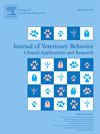近期兽医专业毕业生行为医学自我认知能力评估的初步研究
IF 1.3
3区 农林科学
Q4 BEHAVIORAL SCIENCES
Journal of Veterinary Behavior-clinical Applications and Research
Pub Date : 2025-04-05
DOI:10.1016/j.jveb.2025.04.001
引用次数: 0
摘要
行为问题可能是宠物主人关注的一个重要原因,兽医通过与主人一起管理这些问题,在支持人与动物之间的纽带方面发挥着关键作用。然而,兽医学校在行为医学方面提供的培训机会相对有限,世界各地的兽医往往觉得自己没有准备好在临床实践中管理行为问题。本研究旨在评估澳大利亚近期兽医毕业生在行为医学方面的自我认知能力,重点是识别和区分正常和异常行为,诊断、治疗和预防行为问题。一项针对兽医专业毕业生和具有3年伴侣动物实践经验的兽医(n=54)的在线调查发现,受访者认为识别和区分正常和异常行为的能力最强,而治疗行为问题的能力最差。值得注意的是,74.1%的受访者认为他们的兽医课程在处理行为问题方面准备不足。与那些没有完成兽医行为进一步培训的毕业生相比,完成兽医行为进一步培训的毕业生报告了显著更高的自我感知总体能力得分。这些发现强调了在澳大利亚兽医课程中加强兽医行为培训的必要性,以及继续教育兽医在实践中有效管理行为案例的重要性。本文章由计算机程序翻译,如有差异,请以英文原文为准。
A pilot study evaluating self-perceived competence in behavioral medicine of recent veterinary graduates
Behavioral problems can be a significant cause of concern for pet owners, and veterinarians play a key role in supporting the human-animal bond by working with owners to manage them. However, veterinary schools offer relatively limited training opportunities in behavioral medicine, and veterinarians worldwide often do not feel prepared to manage behavioral problems in clinical practice. This study aimed to assess the self-perceived competence of recent veterinary graduates in Australia regarding behavioral medicine, with a focus on recognizing and distinguishing normal and abnormal behavior, diagnosing, treating, and preventing behavioral problems. An online survey of graduating veterinary students and veterinarians with up to 3 years of experience in companion animal practice (n=54) found that respondents felt most competent in recognizing and distinguishing normal and abnormal behavior, and least competent in treating behavioral problems. Notably, 74.1% of respondents felt inadequately prepared by their veterinary curriculum to handle behavioral problems. Graduates who had completed further training in veterinary behavior reported significantly higher self-perceived overall competence scores compared to those who had not. These findings highlight the need for enhanced training in veterinary behavior within the Australian veterinary curricula and the importance of continuing education in equipping veterinarians to effectively manage behavior cases in practice.
求助全文
通过发布文献求助,成功后即可免费获取论文全文。
去求助
来源期刊
CiteScore
3.50
自引率
16.70%
发文量
107
审稿时长
325 days
期刊介绍:
Journal of Veterinary Behavior: Clinical Applications and Research is an international journal that focuses on all aspects of veterinary behavioral medicine, with a particular emphasis on clinical applications and research. Articles cover such topics as basic research involving normal signaling or social behaviors, welfare and/or housing issues, molecular or quantitative genetics, and applied behavioral issues (eg, working dogs) that may have implications for clinical interest or assessment.
JVEB is the official journal of the Australian Veterinary Behaviour Interest Group, the British Veterinary Behaviour Association, Gesellschaft fr Tierverhaltensmedizin und Therapie, the International Working Dog Breeding Association, the Pet Professional Guild, the Association Veterinaire Suisse pour la Medecine Comportementale, and The American Veterinary Society of Animal Behavior.

 求助内容:
求助内容: 应助结果提醒方式:
应助结果提醒方式:


